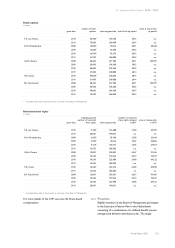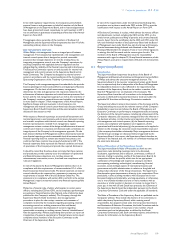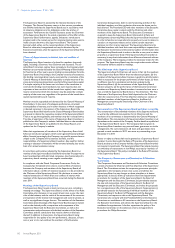Philips 2011 Annual Report Download - page 108
Download and view the complete annual report
Please find page 108 of the 2011 Philips annual report below. You can navigate through the pages in the report by either clicking on the pages listed below, or by using the keyword search tool below to find specific information within the annual report.11 Corporate governance 11.1 - 11.1
108 Annual Report 2011
These rules apply to members of the Executive Committee
correspondingly.
Legal acts as referred to above shall be mentioned in the Annual Report
for the financial year in question. The Rules of Procedure of the Board
of Management and Executive Committee establish further rules on the
reporting of (potential) conflicts of interests. No legal acts as referred
to above have occurred during the financial year 2011.
Amount and composition of the remuneration of the Board
of Management
The remuneration of the individual members of the Board of
Management is determined by the Supervisory Board on the proposal
of the Remuneration Committee of the Supervisory Board, and is
consistent with the policies thereon as adopted by the General Meeting
of Shareholders. The remuneration policy applicable to the Board of
Management was adopted by the 2004 General Meeting of
Shareholders, and lastly amended by the 2008 General Meeting of
Shareholders and is published on the Company’s website. A full and
detailed description of the composition of the remuneration of the
individual members of the Board of Management is included in chapter
10, Supervisory Board report, of this Annual Report.
The remuneration structure, including severance pay, is such that it
promotes the interests of the Company in the medium and long-
term, does not encourage members of the Board of Management to
act in their own interests or take risks that are not in line with the
adopted strategy, and does not reward failing members of the Board of
Management upon termination of their employment. The level and
structure of remuneration shall be determined in the light of factors
such as the results, the share price performance and other
developments relevant to the Company. Deviations on elements of the
remuneration policy in extraordinary circumstances, when deemed
necessary in the interests of the Company, will be disclosed in the
Annual Report or, in case of an appointment, in good time prior to the
appointment of the person concerned.
The main elements of the contract of employment of a new member
of the Board of Management - including the amount of the fixed base
salary, the structure and amount of the variable remuneration
component, any severance plan, pension arrangements and the general
performance criteria - shall be made public no later than at the time of
issuance of the notice convening the General Meeting of Shareholders
in which a proposal for appointment of that member of the Board of
Management has been placed on the agenda. From August 1, 2003
onwards, for new members of the Board of Management the term of
their contract of employment is set at four years, and in case of
termination, severance payment is limited to a maximum of one year’s
base salary; if the maximum of one-year’s salary would be manifestly
unreasonable for a member of the Board of Management who is
dismissed during his first term of office, the member of the Board of
Management shall be eligible for a severance payment not exceeding
twice the annual salary. Current members of the Board of Management
are employed by means of a contract of employment. Subject to the
implementation of new legislation, new members of the Board of
Management will be employed by means of an agreement of assignment
(overeenkomst van opdracht). The Company does not grant personal
loans, guarantees or the like to members of the Board of Management,
and no such (remissions of) loans and guarantees were granted to such
members in 2011, nor are outstanding as per December 31, 2011.
In 2003, Philips adopted a Long-Term Incentive Plan (‘LTIP’ or the
‘Plan’), lastly amended by the 2009 General Meeting of Shareholders,
consisting of a mix of restricted shares rights and stock options for
members of the Board of Management, Philips executives and other key
employees. This Plan was approved by the 2003 General Meeting of
Shareholders. Future substantial changes to the Plan applicable to
members of the Board of Management will be submitted to the General
Meeting of Shareholders for approval. As from 2002, the Company
grants fixed stock options that expire after ten years to members of
the Board of Management (and other grantees). The options vest after
three years and may therefore not be exercised in the first three years
after they have been granted. Options are granted at fair market value,
based on the closing price of Euronext Amsterdam on the date of grant,
and neither the exercise price nor the other conditions regarding the
granted options can be modified during the term of the options, except
in certain exceptional circumstances in accordance with established
market practice. The value of the options granted to members of the
Board of Management and other personnel and the method followed
in calculating this value are stated in the notes to the annual accounts.
Philips is one of the first companies to have introduced restricted shares
as part of the LTIP. A grantee will receive the restricted shares in three
equal installments in three successive years, provided he/she is still with
Philips on the respective delivery dates. If the grantee still holds the
shares after three years from the delivery date, Philips will grant 20%
additional (premium) shares, provided he/she is still with Philips. The
Plan is designed to stimulate long-term investment in Philips shares. To
further align the interests of members of the Board of Management and
shareholders, restricted shares granted to these members of the Board
of Management shall be retained for a period of at least five years, or
until at least the end of employment, if this period is shorter.
The actual number of long-term incentives (both stock options and
restricted shares rights) that are to be granted to the members of the
Board of Management will be determined by the Supervisory Board and
depends on the achievement of the set team targets in the areas of
responsibility monitored by the individual members of the Board of
Management and on the share performance of Philips. The share
performance of Philips is measured on the basis of the Philips Total
Shareholder Return (TSR) compared to the TSR of a peer group of 12
leading multinational electronics/electrical equipment companies over
a three-year period; the composition of this group is described in the
section Supervisory Board Report. With regard to stock options the
TSR performance of Philips and the companies in the peer group is
divided into three groups: top 4, middle 4 and bottom 4. Based on this
relative TSR position, the Supervisory Board establishes a multiplier
which varies from 1.2 to 0.8 and depends on the group in which the
Philips TSR result falls. With regard to restricted share rights the TSR
performance of Philips and the companies in the peer group is ranked
from 1 to 12. Based on this relative TSR position, the Supervisory Board
establishes a multiplier which varies from 0.0 to 2.0 and depends on the
TSR position of Philips within the peer group. Every individual grant,
the size of which depends on the positions and performance of the
individuals, will be multiplied by the TSR-multiplier.
The so-called ultimum remedium clause and claw-back clause of best
practice provisions II.2.10 and II.2.11 of the Dutch Corporate
Governance Code is applicable to Annual Incentive payments and LTIP
grants for the year 2009 onwards to all members of the Board of
Management. In respect of the LTIP grants, the ultimum remedium
clause can be applied to the performance-related actual number of
stock options and restricted share rights that is (unconditionally)
granted.
Members of the Board of Management hold shares in the Company for
the purpose of long-term investment and are required to refrain from
short-term transactions in Philips securities. According to the Philips
Rules of Conduct on Inside Information, members of the Board of
Management are only allowed to trade in Philips securities (including
the exercise of stock options) during ‘windows’ of ten business days
following the publication of annual and quarterly results (provided the
person involved has no ‘inside information’ regarding Philips at that
time) unless an exemption is available. Furthermore, the Rules of
Procedure of the Board of Management and Executive Committee
contain provisions concerning ownership of and transactions in non-
Philips securities by members of the Board of Management. Members
of the Board of Management are prohibited from trading, directly or
indirectly, in securities of any of the companies belonging to the peer
group, during one week preceding the disclosure of Philips’ annual or
quarterly figures. These rules apply to members of the Executive
Committee correspondingly. Transactions in shares in the Company
carried out by members of the Board of Management or members of
the Supervisory Board are notified to the Netherlands Authority for
the Financial Markets (AFM) in accordance with Dutch law and, if
necessary, to other relevant authorities.
Indemnification of members of the Board of Management
and Supervisory Board
Unless the law provides otherwise, the members of the Board of
Management and of the Supervisory Board shall be reimbursed by the
Company for various costs and expenses, such as the reasonable costs
of defending claims, as formalized in the articles of association. Under
certain circumstances, described in the articles of association, such as
an act or failure to act by a member of the Board of Management or a
member of the Supervisory Board that can be characterized as
intentional (‘opzettelijk’), intentionally reckless (‘bewust roekeloos’) or
seriously culpable (‘ernstig verwijtbaar’), there will be no entitlement
to this reimbursement. The Company has also taken out liability
insurance (D&O - Directors & Officers) for the persons concerned.
























